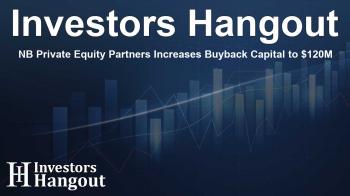NB Private Equity Partners Increases Buyback Capital to $120M

NB Private Equity Partners Boosts Buyback Capital to $120 Million
NB Private Equity Partners Limited (LSE: NBPE) has made a significant move to enhance its shareholder value by increasing the capital reserved for share buybacks to an impressive $120 million over the upcoming three years. This strategic decision comes amidst a challenging market landscape, particularly within the listed private equity sector.
Background on Share Buybacks
Share buybacks are a powerful tool for companies looking to return value to their shareholders. In essence, by repurchasing its own shares, a company can reduce the number of outstanding shares in the market, potentially leading to an increase in share value. This approach highlights the company's confidence in its ongoing operations and future prospects.
Over the years, NBPE has demonstrated a solid commitment to returning capital to its investors, boasting over $420 million returned since its inception primarily through dividends. The Board of Directors recognized that in today’s market environment, characterized by substantial share price discounts in the private equity sector, increasing the buyback capital makes strategic sense.
Confidence in Current Portfolio
This decision signals the Board's confidence in the resilience and potential growth of NBPE’s portfolio. The move to allocate $120 million for buybacks reflects the opportunity for NAV (Net Asset Value) accretion. The co-investment model employed by NBPE allows them to operate flexibly, facilitating the deployment of additional capital towards buybacks.
Utilizing Excess Capital
Alongside the buybacks, NBPE is maintaining its dividend strategy. It is anticipated that nearly $250 million will be returned to shareholders over the next three years if the current dividend level remains stable and the buyback capital is optimally utilized. This alignment of strategies demonstrates a forward-thinking approach to capital allocation.
Details of the Buyback Framework
To better clarify its capital allocation strategy, NBPE has laid out a refined framework consisting of two key components: investments in their primary funding strategies and returning capital to shareholders via dividends and buybacks.
Investment Strategies Moving Forward
The Board recognizes long-term investments as vital to the health of the company. Their investment manager has an established track record of achieving successful co-investments, which have historically fueled performance and growth in NAV. As of now, NBPE is fully invested at 102%, but the company is poised to make adjustments in accordance with market conditions.
Commitment to Shareholder Returns
NBPE’s leadership remains steadfast in their commitment to a solid dividend policy, targeting a yield of at least 3%. For the forthcoming year, the Board projects to keep the dividend at $0.47 per share, which amounts to approximately $43 million in returns based on current NAV levels.
Criteria for Buybacks
The buyback capital will be allocated based on specific parameters like market conditions, performance metrics, and the share price's discount to NAV. With a proactive stance, the Board has directed their broker to facilitate share repurchases in alignment with these outlined criteria.
Looking Ahead: Strategic Insights
William Maltby, Chairman of NB Private Equity Partners, emphasized the significance of this capital enhancement for buybacks. His statement reinforces the belief that share buybacks present attractive opportunities that can lead to substantial benefits for shareholders. The commitment to maximizing returns is evident not only through re-investments but also through returning capital after consultations with stakeholders.
Future Outlook
As NBPE continues its journey, the focus remains on balancing returns through dividends and strategic investments. The move to increase capital reserved for buybacks reflects an ongoing dedication to shareholder value, ensuring that both short-term and long-term interests are adequately addressed.
Frequently Asked Questions
What is the total amount reserved for buybacks by NBPE?
NBPE has reserved a total of $120 million for buybacks over the next three years.
What are share buybacks and why are they important?
Share buybacks involve a company purchasing its own shares from the marketplace, reducing the number of outstanding shares and potentially increasing the share value, which is beneficial for shareholders.
How does NBPE plan to use the capital reserved for buybacks?
The capital will be utilized for share repurchases based on specific market conditions and performance criteria, aimed at maximizing shareholder returns.
What is the current dividend policy of NBPE?
NBPE aims for an annual yield of at least 3% on NAV, and plans to maintain its dividend at $0.47 per share for the coming year.
How has NBPE previously returned capital to shareholders?
Since inception, NBPE has returned over $420 million to shareholders primarily through dividends and share buybacks.
About The Author
Contact Logan Wright privately here. Or send an email with ATTN: Logan Wright as the subject to contact@investorshangout.com.
About Investors Hangout
Investors Hangout is a leading online stock forum for financial discussion and learning, offering a wide range of free tools and resources. It draws in traders of all levels, who exchange market knowledge, investigate trading tactics, and keep an eye on industry developments in real time. Featuring financial articles, stock message boards, quotes, charts, company profiles, and live news updates. Through cooperative learning and a wealth of informational resources, it helps users from novices creating their first portfolios to experts honing their techniques. Join Investors Hangout today: https://investorshangout.com/
The content of this article is based on factual, publicly available information and does not represent legal, financial, or investment advice. Investors Hangout does not offer financial advice, and the author is not a licensed financial advisor. Consult a qualified advisor before making any financial or investment decisions based on this article. This article should not be considered advice to purchase, sell, or hold any securities or other investments. If any of the material provided here is inaccurate, please contact us for corrections.

